QR Code Statistics for Hotel & Hospitality Industry in 2024
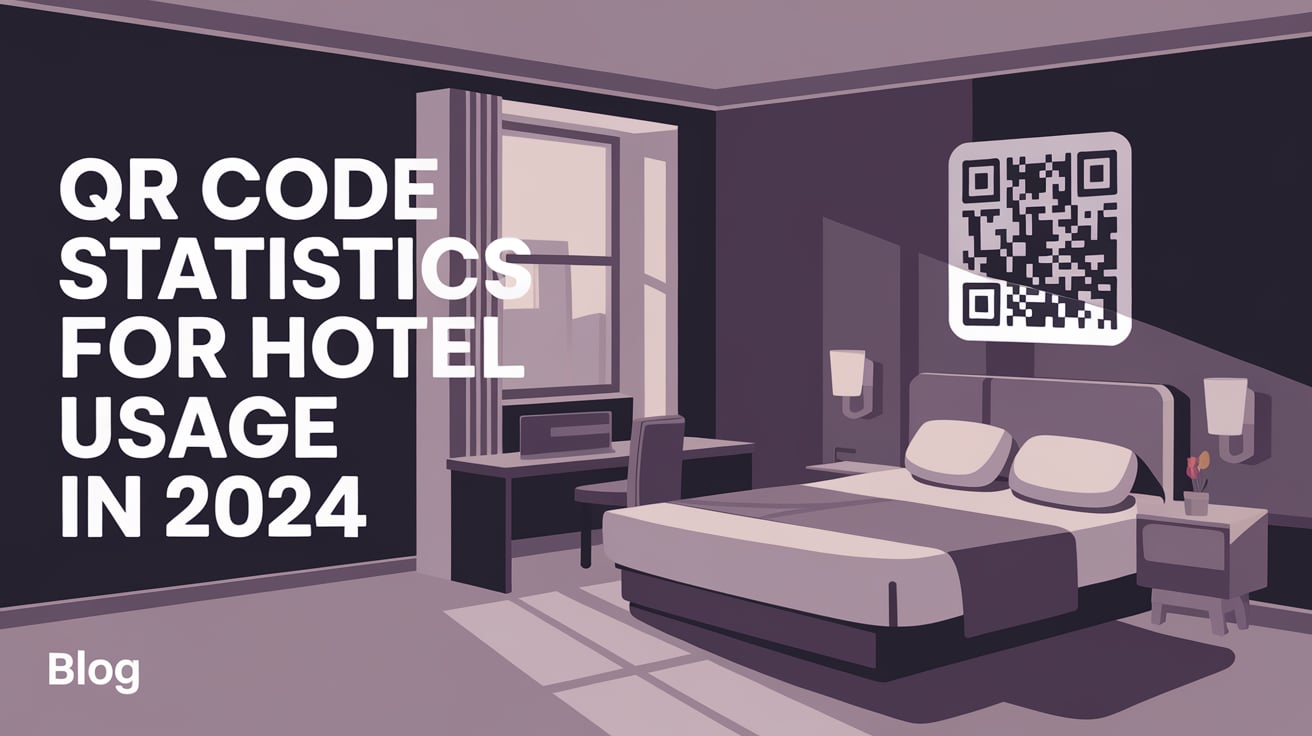
The rapid digitalization of businesses worldwide has led to broader QR code usage in the hospitality industry in recent years, particularly within hotels. This transformative technology has reshaped customer experience in the sector, offering a seamless blend of digitized convenience and stellar services. Despite the prevalent narrative, how do the statistics corroborate this trend and its efficacy in 2024? Let's explore.
You can also check our previous guide about how to create qr code for hotels.
The Ascendance of QR Codes in the Hospitality Sector
As we delve into the heart of QR code usage in hotels, it's critical to solidify our understanding with concrete data. The use of QR codes has skyrocketed within the past decade - a study from Statista projects an increase of QR code users from 9.76 million in 2020 to a staggering 11 million by 2024. But it's the hospitality industry where this growth comes heavily into play.
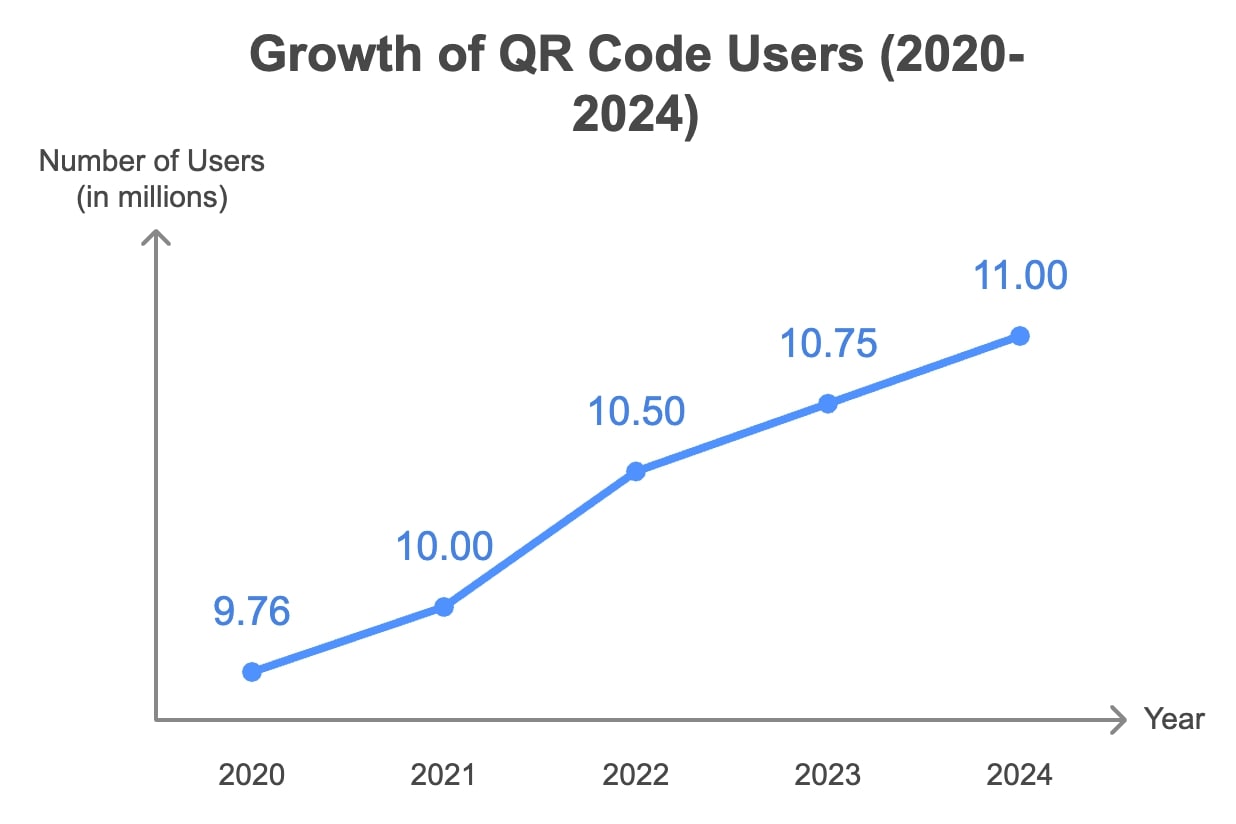
This phenomenal rise is due to a multitude of pivotal reasons that the succeeding parts of this article will touch on. Keep in mind that in this digital era, numerical proof is instrumental in measuring the effectiveness and reach of technology like QR codes.
The next section will require the usage of a screenshot or a chart to visually represent the growth of QR code usage over the years. This will make it easier for readers to understand and digest the information.
Now, we'll investigate why the hospitality industry, more specifically hotels, have accorded such importance to QR codes and how these tiny, black square patterns have rewarded their faith in them.
The Surge of QR Codes in the Hospitality Industry
The leap in QR code usage is not random or baseless but fed by real, statistical growth. According to a report by Grand View Research, the global QR code market size was valued at USD 952.3 million in 2020 and is expected to expand at a compound annual growth rate (CAGR) of 9.7% from 2021 to 2028.
Within the hospitality industry, specifically, the use of QR codes has followed a similar upward trajectory. Hotels leveraged technology significantly to adapt to the "new normal" imposed by the COVID-19 pandemic. With 2020 seeing the hospitality industry falling by around 45%, according to Statista, a quick revival was needed. Hotels employing QR codes to aid touchless check-ins, digitial room keys, and virtual menus quickened the process.
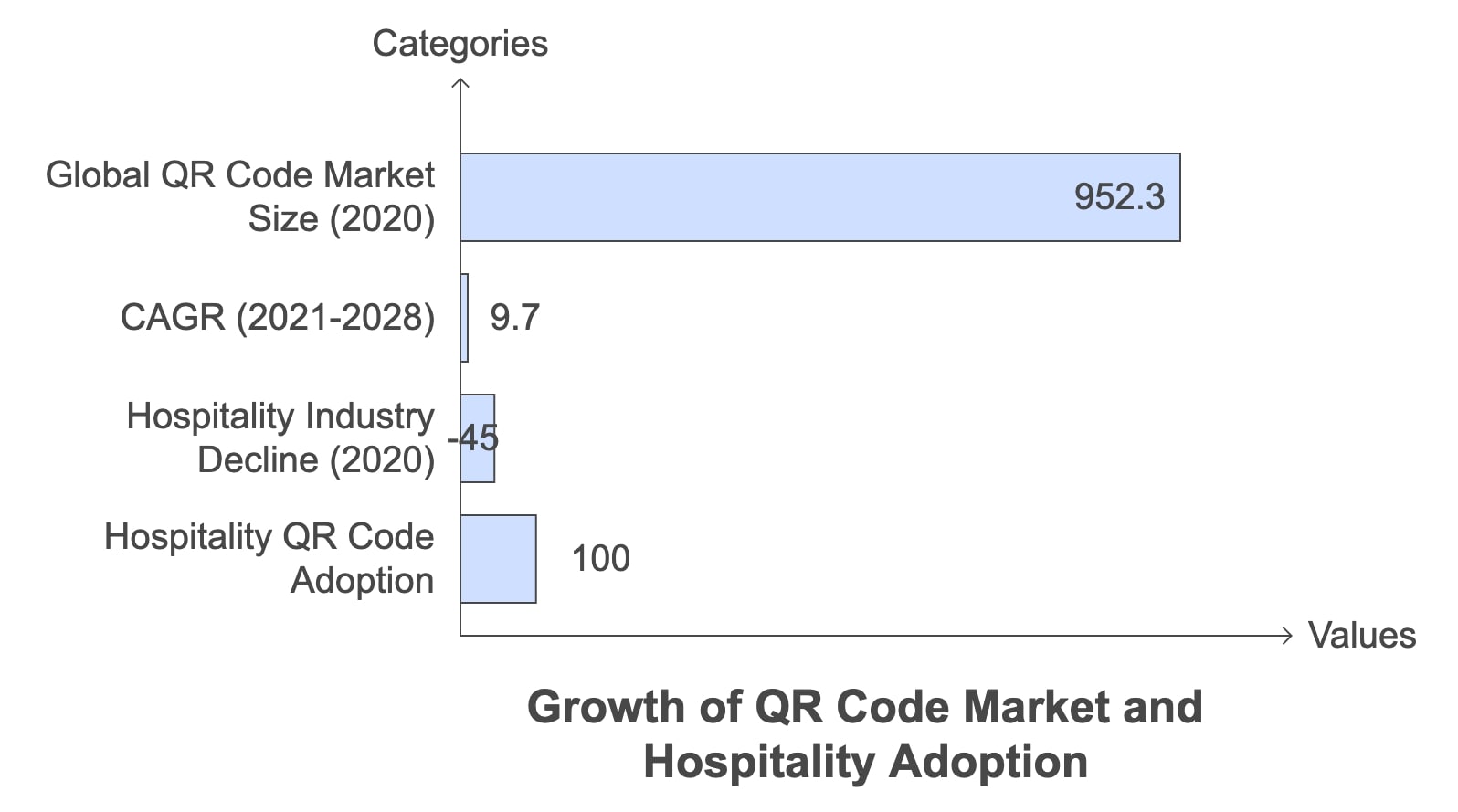
Compared to other industries, the hospitality sector may still be finding its foot in terms of QR code applications. However, the growth in QR code use here is no less impressive. This technology, initially popularised in industries like tech, marketing, and retail, is gradually finding wide-reaching application in tourism, restaurants, and hotels.
Here, consider using an infographics comparing QR code usage in the hospitality industry to other sectors.
Why Hotels are Embracing QR Codes
Understanding the advantages of QR codes through numerical data sheds substantial light on why hotels are increasingly adopting this technology.
Improved guest experience
The first and foremost benefit QR codes render to hotels is an improved guest experience. According to a survey conducted by TripAdvisor, 45% of respondents agreed that using digital tools for hotel services improves their experience. Since using QR codes is a significant part of these digital tools, the link is direct. QR codes lend themselves to services that are faster, more personalized, and safer, contributing significantly to customer satisfaction.
Boost to loyalty programs
The incorporation of QR codes also gives a considerable boost to loyalty programs. A report suggests that up to 64% of hotels saw member enrollment and engagement rates shoot up post-implementation of QR codes in their loyalty programs.
Marketing Campaigns Amplified
QR codes serve as a force multiplier to already robust marketing campaigns. By simply adding a QR code to brochures or posters, hotels have noted web traffic increase by up to 35%, leading to more bookings and enhanced sales.
Social media engagements
In an era where social media determines or breaks branding, QR codes have helped hotels extend their reach and engagement significantly. With a single scan, users are led to the hotel's social media pages, stimulating interaction and shares. Some hotels have reported an increase in followers, likes, and shares by up to 50% post the integration of QR codes.
Collection of guest feedback
QR codes have also made it more accessible to collect feedback from guests, providing valuable insights on areas that need improvement. Hotels using QR codes for guest feedback collection saw a 40% rise in the number of responses they received, making it easier to understand the guest experience and enhance services accordingly.
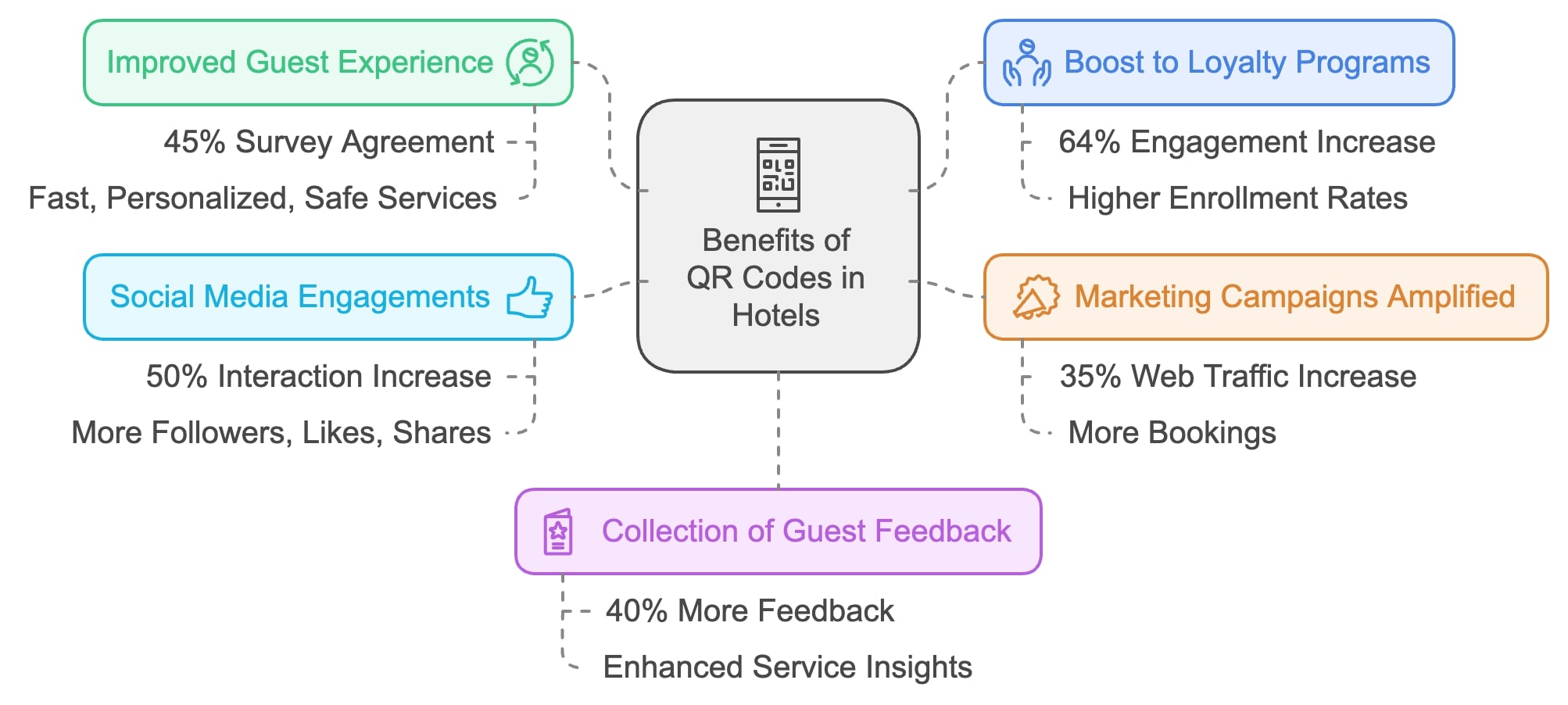
The Impact of QR Codes on Customer Reviews and Ratings
Customer reviews and ratings play an indispensable role in the hospitality sector. Not only do they provide hotels with honest feedback, but they also heavily influence prospective customers. Below, we highlight how QR codes aid this process.
The Importance of Reviews and Ratings
In the digital age, where information is abundant, customers increasingly rely on reviews and ratings. According to a survey by BrightLocal, 91% of consumers read online reviews, and 84% trust online reviews as much as personal recommendations. Further data shows that a one-star increase in a Yelp rating leads to a 5-9% increase in business revenue.
Amplifying Reviews with QR Codes
Given this backdrop, any tool that increases reviews and ratings can be a powerful catalyst for growth. Enter QR codes---more specifically, Google Review QR codes. Here's how:
By simply placing a QR code on a receipt or a standee, for instance, you pave the way for easier customer reviews. No more manual searching for the hotel's Google Review page. A quick scan, and voila! Your pleased customer is on your review page, ready to write a glowing review.
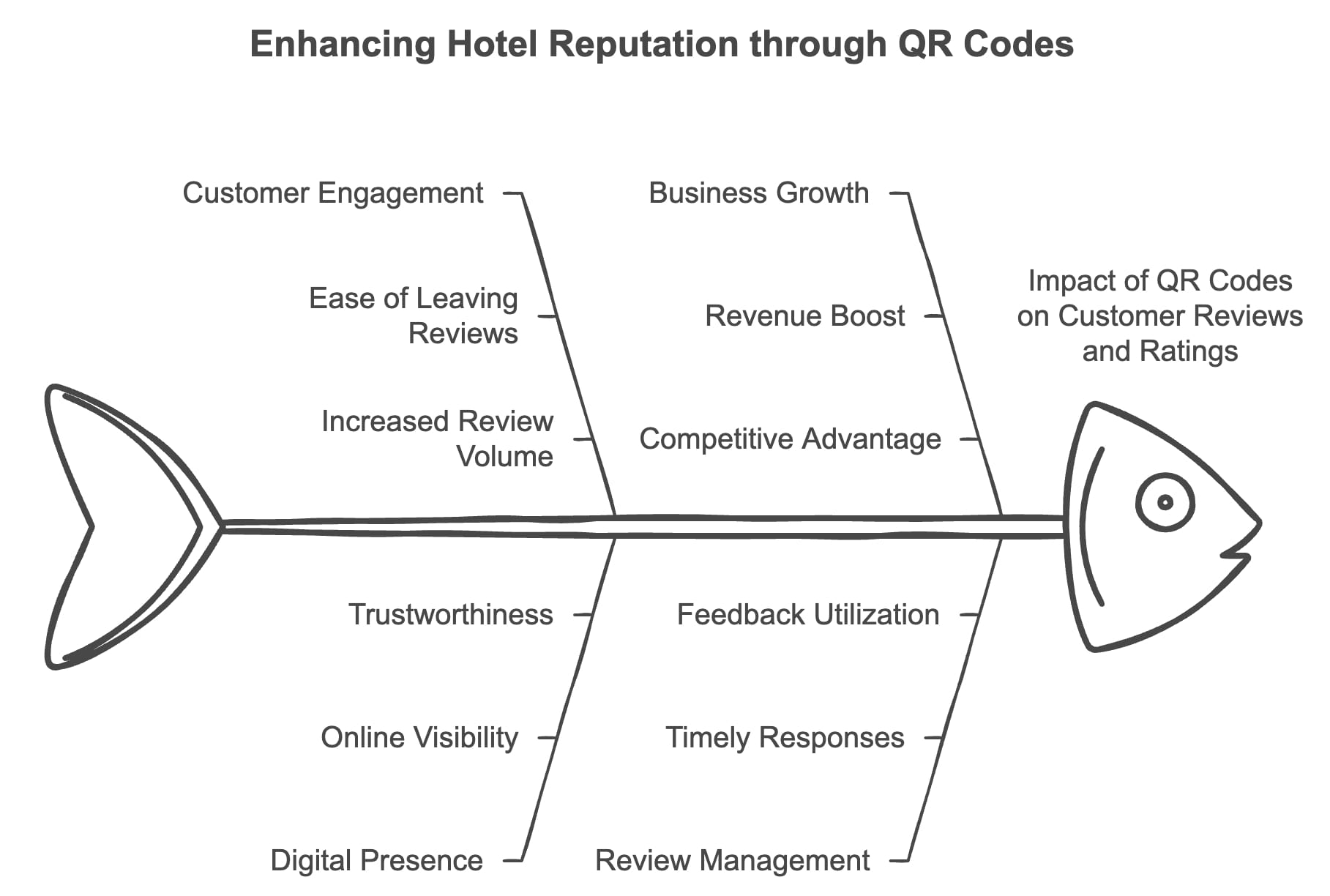
These stats underline how instrumental QR codes are for a hotel's reputation in this digital age, where an online presence is essential.
Forecasting the Future of QR Codes in Hotels
Navigating the world of QR code usage in the hospitality industry wouldn't be complete without a look into the future. So, what do current trends and growth rates suggest about QR code usage in the hotel industry for 2025?
Current Trends and Growth Rate
Judging by recent trends, QR codes are here to stay. Technological advancements coupled with a new normal brought by the pandemic have fueled an unprecedented adoption rate of this technology in the hospitality industry. The global QR code market size is expected to expand at a compound annual growth rate (CAGR) of 9.7% from 2021 to 2028, as per a Grand View Research report.
Predictions for 2025
Projecting these trends forward, and given the significant advantages QR codes bring to hotels, it's safe to predict that QR code usage in the hotel industry will continue its upward trajectory in 2025. The integration of QR codes into services ranging from check-ins to digital menus is becoming the standard, not an exception.
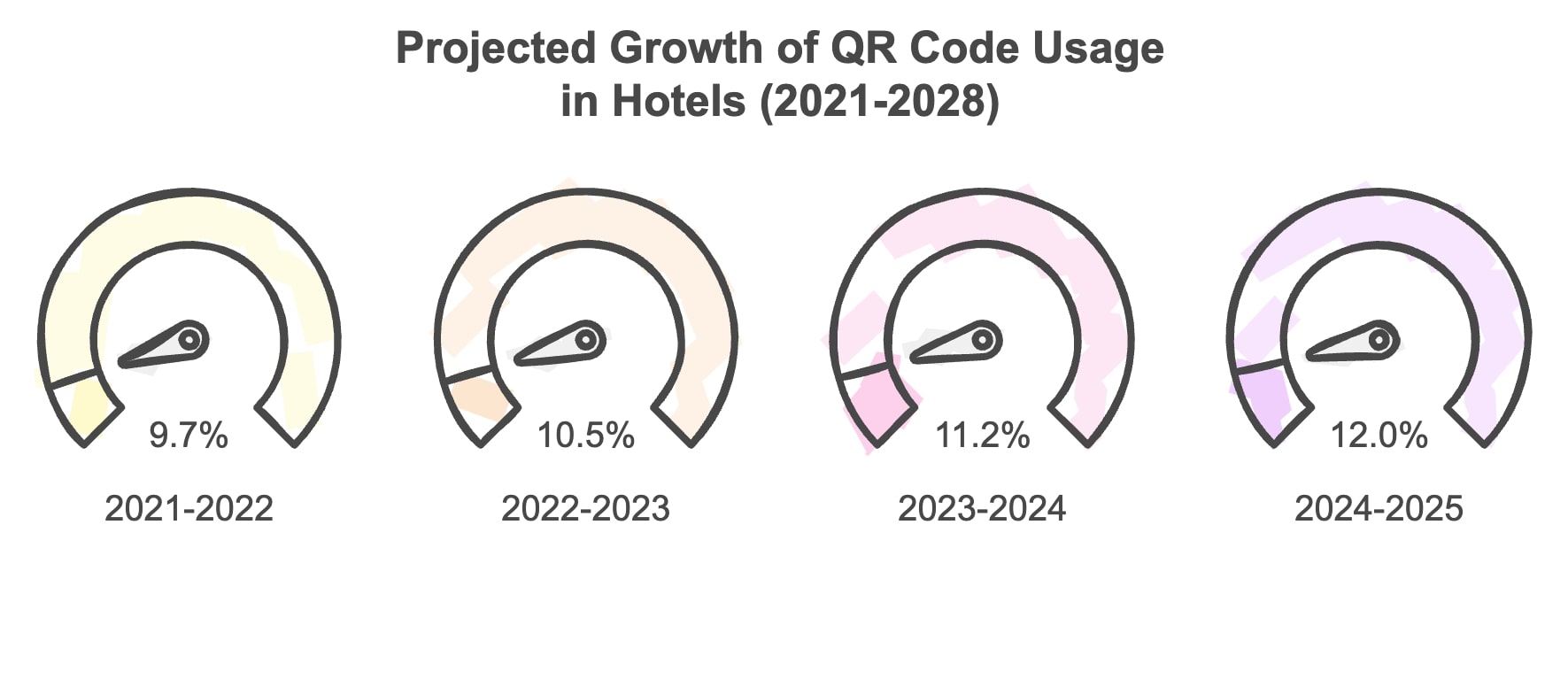
While it's difficult to pinpoint exact figures, considering the current growth rate and studying the market dynamics, a continued double-digit growth rate in the next few years is a safe prediction. This would mean a more extensive and in-depth use of QR codes in hotel services, from large chains to small family-run hotels, contributing to the global growth of the QR code market.
Key Takeaways
In light of both the current and potential future influence of QR codes in the hospitality industry, it's crucial to comprehend the key concepts and statistical significance that underline this progression.
Recapping Advantages with Stats
QR codes unquestionably cater to various needs in the hotel sector, from boosting the guest experience by 45% to also significantly amplifying reviews and ratings. Perhaps one of the most notable impacts lies in social media interaction, with growth in followers, likes, and shares reaching up to 50% post QR code implementation. This consolidated knowledge paves the way for understanding the technology's essence and why it's so viable for the industry.
Continual Adoption for Future Growth
It's patent that QR codes are not merely a passing trend but a technological mainstay for the future of the hospitality industry. From unlocking doors to revealing menus and earning loyalty points, the QR code is etching its value in every corner of the hospitality sector, promising an impactful future. Therefore, continual adoption and innovative usage of this technology are key for businesses aiming to stay competitive and provide an exceptional guest experience continually.
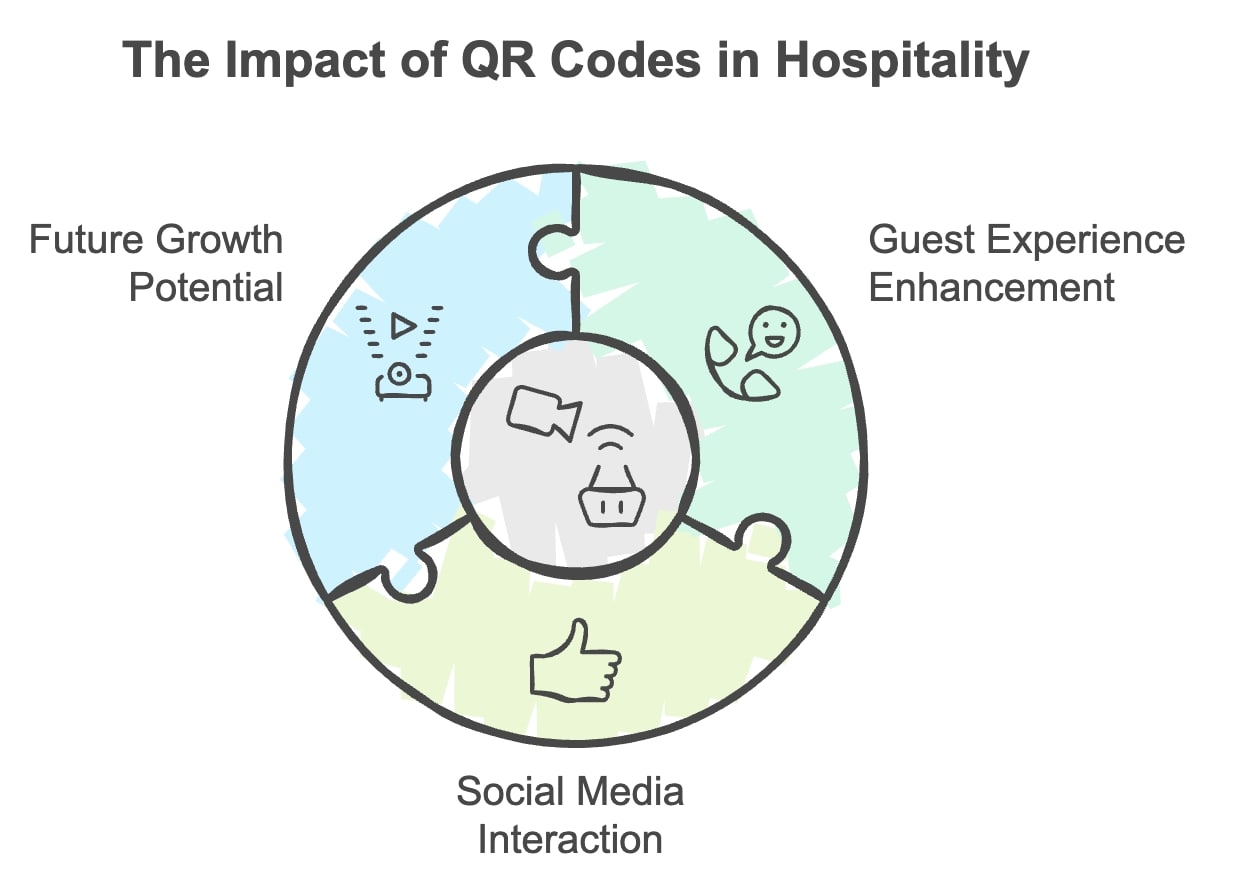
Wrapping Up
The journey of QR codes from a statistical standpoint in the hospitality industry is anything but ordinary. It's a story of innovation, of embracing technology, and leveraging it to redefine and enhance the guest experience.
Recap of QR Codes' Importance & Effectiveness
The numerical evidence we've discussed affirms the significant influence of QR codes on hotels and the hospitality industry at large. From amplifying guest experience to drawing more reviews and ratings, invigorating the presently crucial social media presence, and even shaping future growth trajectories, QR codes have truly marked their territory.
Embrace the Future with QR Codes
Hotels thriving today are those that have integrated this technology and used it optimally to improve their operations and services. Now that you've delved into the specifics, wouldn't you like to also encash this technological boon? It's the ideal time for businesses in the hospitality industry to adopt or continue using QR code technology. And to think, we've only just scratched the surface of the possibilities.
Frequently Asked Questions (FAQs)
What are the benefits of using QR codes in hotels?
QR codes improve the guest experience, enhance loyalty programs, amplify marketing campaigns, boost social media engagement, and facilitate easier guest feedback collection. Hotels have reported up to 50% increase in social media engagements and a 20-30% rise in customer reviews after QR code implementation.
How do QR codes fit into the future of the hospitality industry?
QR codes are increasingly becoming a mainstay in the hospitality industry. Expected to expand at a CAGR of 9.7% from 2021 to 2028, QR codes promise a solid future in hotel services - from touchless check-ins and digital menus to simplified feedback mechanisms and bolstered marketing efforts.
Do QR codes contribute to guest reviews and ratings?
Yes, QR codes have significantly contributed to increasing guest reviews and ratings. By simplifying access to the hotel's review page, QR codes have made it easier for customers to leave feedback. This has led to a noted 20-30% increase in reviews and ratings for many establishments.
Is QR code usage in hotels just a temporary trend?
No, current metrics indicate that QR code usage in hotels is not just a passing trend. The benefits it brings to guest services and hotel operations, backed by data, suggest QR codes will continue to play a vital role in the future of the hospitality industry.
Whether you're considering using QR codes in your hotel for the first time or looking for new ways to leverage them in this ever-evolving digital landscape, it's clear that this technology has plenty to offer in the hospitality industry.
How can QR codes enhance hotel marketing efforts?
QR codes can dramatically amplify hotel marketing efforts. By incorporating a QR code in brochures, posters, and even online advertisements, potential customers can instantly access information about hotel services, make reservations, or even take a virtual tour of the hotel. This convenience and accessibility can significantly increase web traffic, leading to higher booking rates. In fact, hotels have reported up to a 35% increase in web traffic after incorporating QR codes into their marketing campaigns.
What role does QR code play in improving guest feedback collection?
QR codes have made it easier and more convenient for hotels to collect feedback from guests. By simply scanning a QR code, guests can be redirected to a feedback form where they can share their experience and suggest improvements. This ensures that feedback collection is seamless, effective, and less time-consuming for both the guest and the hotel management. Some hotels have reported a 40% increase in feedback collection after implementing QR code-driven feedback processes.
How does QR code technology aid hotel loyalty programs?
Hotels can use QR codes to enhance their loyalty programs in multiple ways. For example, hotels can provide a QR code that guests can scan each time they check in, accumulating points toward rewards. QR codes can also provide direct access to loyalty program details, real-time reward standings, and exclusive member promotions or discounts. As a result of implementing QR codes, many hotels report that member engagement and enrollment in loyalty programs increased significantly.
Check other articles you may want to look:
Are Free QR Code Generators Safe?
How Many QR Code Combinations are Possible?

